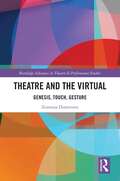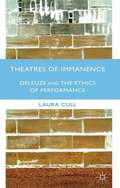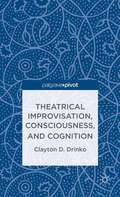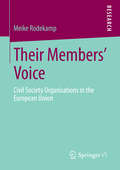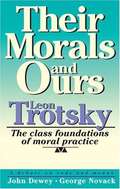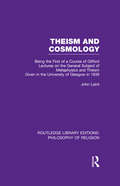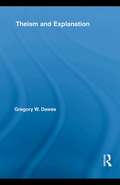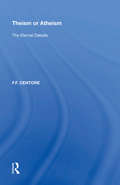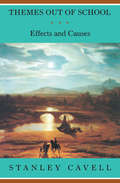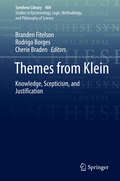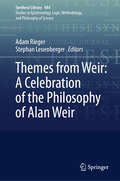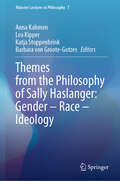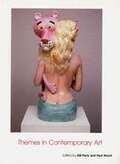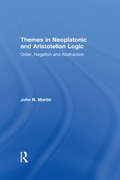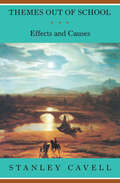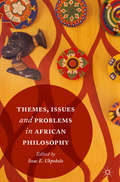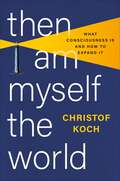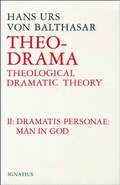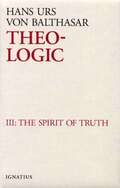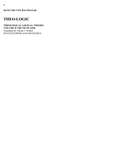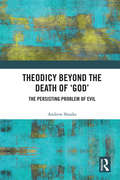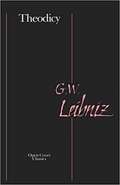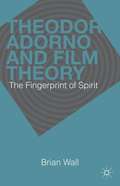- Table View
- List View
Theatre and the Virtual: Genesis, Touch, Gesture (Routledge Advances in Theatre & Performance Studies)
by Zornitsa DimitrovaTheatre and the Virtual lays out a set of conceptual instruments for the articulation and engendering of the forces of theatrical potentiality. Creating a passage toward a reconstitution of the given, a theatre of the virtual opens bodies in motion to a region of an ongoing genesis of forces. The outcome: regimes of constraint are abandoned through a radical practice of ecological attunement. Violence is eschewed through an onto-ecology of touch. Closed systems are repotentialised to become co-constitutive of their environments. A logic of spectrality settles in—not so much entities as atmospheres, not so much a being as a style of being, not so much a body as multitudinous milieus of response. This is the task of a theatre of the virtual—to safeguard the possibility of the extra-epistemological and uphold one’s right to offer accounts of oneself from outside of being, all the while creating a fractured record of the wondrous mutations of a moving, gesturing body. This book will be of great interest to students and scholars in theatre, philosophy, new materialisms, environmental humanities, gesture, and the ontology of response.
Theatres of Immanence
by Laura CullTheatres of Immanence: Deleuze and the Ethics of Performance, now available in paperback, is the first monograph to provide an in-depth study of the implications of Gilles Deleuze's philosophy for theatre and performance. Engaging with a wide range of interdisciplinary practitioners including Goat Island, Butoh, Artaud, John Cage, the Living Theatre, Robert Wilson and Allan Kaprow, as well as with the philosophies of Deleuze and Guattari, Henri Bergson and Fran#65533;ois Laruelle, the book conceives performance as a way of thinking 'immanence': the open and endlessly creative whole of which all things are a part. Theatres of Immanence builds upon Deleuze's emphasis on immanence, affect, change and movement to provide new approaches to five key topics in theatre and performance: 1) authorship and collaboration, 2) voice and language, 3) animals in performance, 4) audience participation and 5) time or duration. The book provides an accessible introduction to Deleuze's ideas and draws attention to the ethical dimensions of performance, asking: 'what good is theatre, and particularly immanent theatre, anyway?
Theatrical Improvisation, Consciousness, and Cognition
by Clayton D. DrinkoImprovisation teachers have long known that the human mind could be trained to be effortlessly spontaneous and intuitive. Drinko explores what these improvisation teachers knew about improvisation's effects on consciousness and cognition and compares these theories to current findings in cognitive neuroscience, psychology, and philosophy.
Their Members' Voice
by Meike RodekampThe role of civil society organisations in Brussels is debated. Some view them as representatives of their members and thus as legitimising agents for policy-making in the European Union. Others see them as being elitist and out of touch with their membership bases, therefore ill-suited to promote democracy at the EU level. Taking civil society organisations in the EU's external relations as an example, Meike Rodekamp submits these controversial views to a reality check. Interviews with representatives of civil society organisations in Brussels and their member organisations in the EU show that the Brussels offices have not lost contact with their members. However, member organisations differ substantially in their participation in internal decision-making processes, which raises doubts about the legitimacy gains through civil society participation in EU policy-making.
Their Morals And Ours: The Class Foundations Of Moral Practice
by John Dewey Leon Trotsky Victor Serge George NovackParticipating in the revolutionary workers movement "with open eyes and an intense will--only this can give the highest moral satisfaction to a thinking being," Trotsky writes. He explains how morality is rooted in the interests of contending social classes. With a reply by the pragmatist philosopher John Dewey and a Marxist response to Dewey by George Novack. Glossary, index.
Theism and Cosmology: Being the First Series of a Course of Gifford Lectures on the General Subject of Metaphysics and Theism given in the University of Glasgow in 1939 (Routledge Library Editions: Philosophy of Religion)
by John LairdTheism is one of the major types of metaphysics and cosmology is the general theory of the whole wide world. Must the world have an over-worldly source, or any source? Would "space" crumble unless God perpetually sustained it by his brooding omnipresence? Is all power, properly understood, divine power? These large questions, never out of date, are examined by Professor Laird in the light of contemporary philosophy. This seminal work, originally published in 1940 is a lucid and profound discussion in theological philosophy.
Theism and Explanation (Routledge Studies in the Philosophy of Religion)
by Gregory W. DawesIn this timely study, Dawes defends the methodological naturalism of the sciences. Though religions offer what appear to be explanations of various facts about the world, the scientist, as scientist, will not take such proposed explanations seriously. Even if no natural explanation were available, she will assume that one exists. Is this merely a sign of atheistic prejudice, as some critics suggest? Or are there good reasons to exclude from science explanations that invoke a supernatural agent? On the one hand, Dawes concedes the bare possibility that talk of divine action could constitute a potential explanation of some state of affairs, while noting that the conditions under which this would be true are unlikely ever to be fulfilled. On the other hand, he argues that a proposed explanation of this kind would rate poorly, when measured against our usual standards of explanatory virtue.
Theism or Atheism: The Eternal Debate
by F.F. CentoreFrom the time of the thinkers of ancient Greece, the question of what can be said about the existence and nature of God has been debated by many philosophers and theologians. In Theism and Atheism: The Eternal Debate, F.F. Centore presents a broad analysis of the major positions that address the question and the thinkers who have contributed to the debate. This is an admirably lucid and thorough examination of the history of natural theology. Covering the material in a thematic rather than in a strictly chronological way, Centore draws out the key positions on topics such as the relationship of science and religion, the problem of evil, Naturalistic and Supernaturalistic theism and the dispute between essence and existence. The proponents of the various positions are considered alongside their most explicit critics. Important thinkers dealt with in this work include Plato, Aristotle, Aquinas, Descartes, Pascal, Kant, Hume, Hegel, Nietzsche, Freud and Darwin. The diversity of exploration also goes beyond the Judeo-Christian tradition to look at Hinduism, Buddhism, Stoicism, Zoroastrianism, Confucianism and Classical Paganism. This work, however, is much more than a survey of the major historical arguments and rebuttals concerning God's existence and nature. Overall, it is a work by a well-established Catholic philosopher who concludes that God's existence and nature are indeed compatible with modern science, human freedom and the existence of evil in the world.
Themes Out Of School: Effects and Causes
by Stanley CavellIn the first essay of this book, Stanley Cavell characterizes philosophy as a "willingness to think not about something other than what ordinary human beings think about, but rather to learn to think undistractedly about things that ordinary human beings cannot help thinking about, or anyway cannot help having occur to them, sometimes in fantasy, sometimes as a flash across a landscape. " Fantasies of film and television and literature, flashes across the landscape of literary theory, philosophical discourse, and French historiography give Cavell his starting points in these twelve essays. Here is philosophy in and out of "school," understood as a discipline in itself or thought through the works of Shakespeare, Molière, Kierkegaard, Thoreau, Brecht, Makavejev, Bergman, Hitchcock, Astaire, and Keaton.
Themes from Klein: Knowledge, Scepticism, and Justification (Synthese Library #404)
by Branden Fitelson Rodrigo Borges Cherie BradenThis volume features more than fifteen essays written in honor of Peter D. Klein. It explores the work and legacy of this prominent philosopher, who has had and continues to have a tremendous influence in the development of epistemology. The essays reflect the breadth and depth of Klein's work. They engage directly with his views and with the views of his interlocutors. In addition, a comprehensive introduction discusses the overall impact of Klein's philosophical work. It also explains how each of the essays in the book fits within that legacy. Coverage includes such topics as a knowledge-first account of defeasible reasoning, felicitous falsehoods, the possibility of foundationalist justification, the many formal faces of defeat, radical scepticism, and more. Overall, the book provides readers with an overview of Klein’s contributions to epistemology, his importance to twentieth and twenty-first-century philosophy, and a survey of his philosophical ideas and accomplishments. It's not only a celebration of the work of an important philosopher. It also offers readers an insightful journey into the nature of knowledge, scepticism, and justification.
Themes from Klein: Knowledge, Scepticism, and Justification (Synthese Library #404)
by Branden Fitelson Rodrigo Borges Cherie BradenThis volume features more than fifteen essays written in honor of Peter D. Klein. It explores the work and legacy of this prominent philosopher, who has had and continues to have a tremendous influence in the development of epistemology. The essays reflect the breadth and depth of Klein's work. They engage directly with his views and with the views of his interlocutors. In addition, a comprehensive introduction discusses the overall impact of Klein's philosophical work. It also explains how each of the essays in the book fits within that legacy. Coverage includes such topics as a knowledge-first account of defeasible reasoning, felicitous falsehoods, the possibility of foundationalist justification, the many formal faces of defeat, radical scepticism, and more. Overall, the book provides readers with an overview of Klein’s contributions to epistemology, his importance to twentieth and twenty-first-century philosophy, and a survey of his philosophical ideas and accomplishments. It's not only a celebration of the work of an important philosopher. It also offers readers an insightful journey into the nature of knowledge, scepticism, and justification.
Themes from Weir: A Celebration of the Philosophy of Alan Weir (Synthese Library #484)
by Adam Rieger Stephan LeuenbergerThis book celebrates and explores some philosophical issues raised by the work of Alan Weir, who is Professor Emeritus at the University of Glasgow, having previously held positions at the Universities of Oxford, Edinburgh and Queen’s, Belfast. In a number of areas, Weir has elaborated strikingly original views which involve a radical departure from the mainstream. These include formalism in the philosophy of mathematics, and as well as naïve set theory, with a universal set, and a naïve theory of truth. In contrast to other contemporary defenders of the latter two theories, Weir rejects dialetheism and accepts classical rules for the logical connectives. He avoids contradictions by restricting certain structural inference rules, specifically some generalized versions of transitivity. In addition, Weir has developed radical versions of naturalism and physicalism (partly informed by his work on Quine) and perceptual realism. This collection includes contributions by a distinguished group of philosophers on Weir’s philosophy, as well as a memoir and a new essay on the philosophy of mathematics by Weir himself.
Themes from the Philosophy of Sally Haslanger: Gender – Race – Ideology (Münster Lectures in Philosophy #7)
by Anna Kahmen Barbara von Groote-Gotzes Lea Kipper Katja StoppenbrinkThis book offers a critical discussion of Sally Haslanger's philosophical oeuvre. Published on the occasion of the annual Münster Lectures in Philosophy held by Prof. Haslanger in the winter of 2019, it covers both her prominent work on the themes of gender, race, and ideology, as well as her research on social practices and social structures. Conceptual, methodological, practical as well as normative approaches are pursued to more closely understand Sally Haslanger’s claims, arguments, and discursive goals. The direct correspondence between Sally Haslanger and her interlocutors makes this a very unique book suitable for both advanced scholars as well as graduate students.
Themes in Contemporary Art: Art of the 20th Century (Art of the Twentieth Century Ser.)
by Paul Wood Gill PerryIn this fourth volume of the Art of the Twentieth Century series, the contributors address a fascinating variety of themes relating to art from the 1960s to the end of the century?the period of ?postmodernism.? The first of the book's seven chapters deals with the emergence in the 1960s of what has been called an ?expanded field? for art activity. Other chapters discuss the consequences of Conceptual art for notions of the aesthetic; the Post-Conceptual practice of painting; practices of Post-Conceptual photography; video, performance, and installation art; and women's practice and the question of gendered and nongendered objects. The final chapter explores the globalization of art at the end of the twentieth century. Full color illustrations are featured throughout the volume.
Themes in Neoplatonic and Aristotelian Logic: Order, Negation and Abstraction
by John N. MartinWere the most serious philosophers of the millennium 200 A.D. to 1200 A.D. just confused mystics? This book shows otherwise. John Martin rehabilitates Neoplatonism, founded by Plotinus and brought into Christianity by St. Augustine. The Neoplatonists devise ranking predicates like good, excellent, perfect to divide the Chain of Being, and use the predicate intensifier hyper so that it becomes a valid logical argument to reason from God is not (merely) good to God is hyper-good. In this way the relational facts underlying reality find expression in Aristotle's subject-predicate statements, and the Platonic tradition proves able to subsume Aristotle's logic while at the same time rejecting his metaphysics. In the Middle Ages when Aristotle's larger philosophy was recovered and joined again to the Neoplatonic tradition which was never lost, Neoplatonic logic lived along side Aristotle's metaphysics in a sometime confusing and unsettled way. Showing Neoplatonism to be significantly richer in its logical and philosophical ideas than it is usually given credit for, this book will be of interest not just to historians of logic, but to philosophers, logicians, linguists, and theologians.
Themes out of School: Effects and Causes
by Stanley Cavell&“Themes out of School . . . cannot help but urge us to think, in fresh and undistracted ways, about the world that actually confronts us.&” —Jay Parini, Hudson Review In the first essay of this book, Stanley Cavell characterizes philosophy as a &“willingness to think not about something other than what ordinary human beings think about, but rather to learn to think undistractedly about things that ordinary human beings cannot help thinking about, or anyway cannot help having occur to them, sometimes in fantasy, sometimes as a flash across a landscape.&” Fantasies of film and television and literature, flashes across the landscape of literary theory, philosophical discourse, and French historiography give Cavell his starting points in these twelve essays. Here is philosophy in and out of &“school,&” understood as a discipline in itself or thought through the works of Shakespeare, Molière, Kierkegaard, Thoreau, Brecht, Makavejev, Bergman, Hitchcock, Astaire, and Keaton.
Themes, Issues and Problems in African Philosophy
by Isaac E. UkpokoloThis book explores the meaning, nature and scope of a range of aspects of African philosophical discourse and issues raised therein. It examines a range of topics including metaphysics, epistemology, ethics, political philosophy, philosophy of religion and gender studies to offer a comprehensive overview of the branches of philosophy in Africa.
Themistius, Julian, and Greek Political Theory under Rome
by Simon SwainThemistius' close relationship with Christian emperors from Constantius to Theodosius makes him one of the most important political thinkers and politicians of the later fourth century, and his dealings with Julian the Apostate have recently attracted much speculation. This volume presents a new critical edition, translation and analysis of Themistius' letter to Julian about kingship and government, which survives mainly in Arabic, together with texts, translations and analyses of Julian's Letter to Themistius and Sopater's Letter to Himerius. The volume is completed with a text, translation and analysis of the other genuine work of Greek political theory to survive in Arabic, the Letter of Aristotle to Alexander, which dates from an earlier period and throws into relief the particular concerns of Themistius, Julian, and the rulers of the fourth-century Roman world.
Then I Am Myself the World: What Consciousness Is and How to Expand It
by Christof Koch"Deeply personal and infinitely digestible, Then I Am Myself the World is a remarkable must-read for anyone interested in knowing their mind.&”―Judson Brewer MD, PhD, New York Times–bestselling author of Unwinding Anxiety The world&’s leading investigator of consciousness argues that by understanding what consciousness does—cause change in the world—we can understand its origins and its future In Then I Am Myself the World, Christof Koch explores the only thing we directly experience: consciousness. At the book&’s heart is integrated-information theory, the idea that the essence of consciousness is the ability to exert causal power over itself, to be an agent of change. Koch investigates the physical origins of consciousness in the brain and how this knowledge can be used to measure consciousness in natural and artificial systems. Enabled by such tools, Koch reveals when and where consciousness exists, and uses that knowledge to confront major social and scientific questions: When does a fetus first become self-aware? Can psychedelic and mystical experiences transform lives? What happens to consciousness in near-death experiences? Why will generative AI ultimately be able to do the very thing we can do, yet never feel any of it? And do our experiences reveal a single, objective reality? This is an essential book for anyone who seeks to understand ourselves and the future we are creating.
Theo-Drama: Dramatis Personae (Theological Dramatic Theory #2)
by Hans Urs Von BalthasarThe first volume of this series surveyed the great world dramatists to gather concepts and ideas to apply to the real stage, which is the universe God has made and centered into himself as an actor. <p><p>This volume describes the actors, the dramatis personae. This is his theological anthropology concerning man, his freedom and destiny in the light of biblical revelation. Von Balthasar is concerned here with the dramatic character of existence as a whole, approaching the topic through a consideration of the various conditions and situations of mankind as a drama that involves both the Creator and his creatures.
Theo-Logic: The Spirit of Truth (Theological Logical Theory #3)
by Hans Urs von BalthasarTheo-Logic is the third and crowning part of the great trilogy of the masterwork of theologian Hans Urs von Balthasar, following his first two parts, The Glory of the Lord and Theo-Drama. This is the third volume of Theo-Logic. <p><p> Theo-Logic is a variation of theology, it being about not so much what man says about God, but what God speaks about himself. Balthasar does not address the truth about God until he first reflects on the beauty of God (The Glory of the Lord). Then he follows with his reflections on the great drama of our salvation and the goodness and mercy of the God who saves us (Theo-Drama). <p><p>Now, in this work, he is ready to reflect on the truth that God reveals about himself, which is not something abstract or theoretical, but rather the concrete and mysterious richness of God's being as a personal and loving God.
Theo-Logic: The Truth of God (Theological Logical Theory #2)
by Hans Urs von BalthasarTheo-Logic is a variation of theology, it being about not so much what man says about God, but what God speaks about himself. Balthasar does not address the truth about God until he first reflects on the beauty of God (The Glory of the Lord). Then he follows with his reflections on the great drama of our salvation and the goodness and mercy of the God who saves us (Theo-Drama). <p><p>Now, in this work, he is ready to reflect on the truth that God reveals about himself, which is not something abstract or theoretical, but rather the concrete and mysterious richness of God's being as a personal and loving God.
Theodicy Beyond the Death of 'God': The Persisting Problem of Evil
by Andrew ShanksTrue theodicy is partly a theoretical corrective to evangelistic impatience: discounting the distortions arising from over-eager salesmanship. And partly it is a work of poetic intensification, dedicated to faith’s necessary struggle against resentment. This book contains a systematic survey of the classic theoretical-corrective theodicy tradition initiated, in the early Seventeenth Century, by Jakob Böhme. Two centuries later, Böhme’s lyrical thought is translated into rigorous philosophical terms by Schelling; and is, then, further, set in context by Hegel’s doctrine of providence at work in world history. The old ‘God’ of mere evangelistic impatience is, as Hegel sees things, ‘dead’. And so theodicy is liberated, to play its proper role: illustrated here with particular reference to the book of Job, the post-Holocaust poetry of Nelly Sachs, and the thought of Simone Weil. A boldly polemical study, this book is a bid to re-ignite debate on the whole topic of theodicy. As such, it will be of great interest to scholars in religious studies, theology and philosophy.
Theodicy: Essays on the Goodness of God, the Freedom of Man, and the Origin of Evil
by Gottfried LeibnizIn order to be truly free, must you act arbitrarily? If an event did not happen, could it have happened? Since there is evil, and God could have made the world without evil, did God fail to pick the best course? Grappling with such simple--yet still intriguing--puzzles, Leibniz was able to present attractively his new theories of the real and the phenomenal, freewill and determinism, and the relation between minds and bodies. <P><P>Theodicy was Leibniz's only book-length work to be published in his lifetime, and for many years the work by which he was known to the world. Fully at home with the latest scientific advances, Leibniz ultimately rejected the new atomistic philosophies of Descartes, Gassendi, and Hobbes, and drew upon the old cosmology of Aristotelian scholasticism. There could be no conflict, he argued between faith and reason, freedom and necessity, natural and divine law. Ingeniously defending his postulate of pre-established harmony, Leibniz made important advances in the precise analysis of concepts.
Theodor Adorno and Film Theory
by Brian WallWhat is the fundamental nature of the filmic object: is it a commodity or is it, can it be, art? What would that mean - can it still matter? This book introduces the thought of Theodor Adorno into film studies to repair the schism that characterizes the field, as historical and cultural modes of analysis displace theoretical and philosophical ones.
